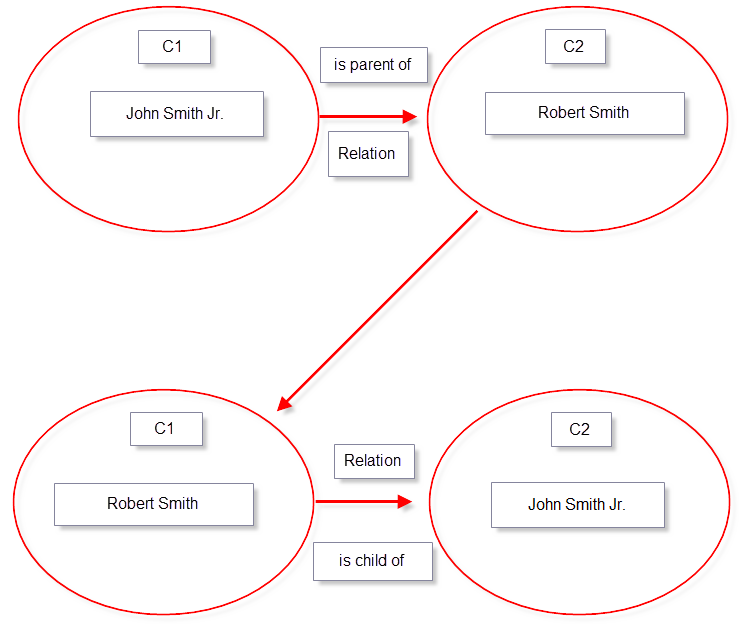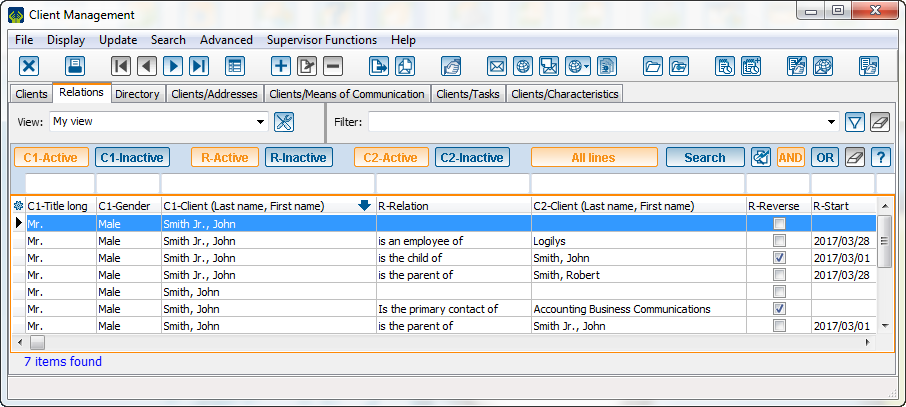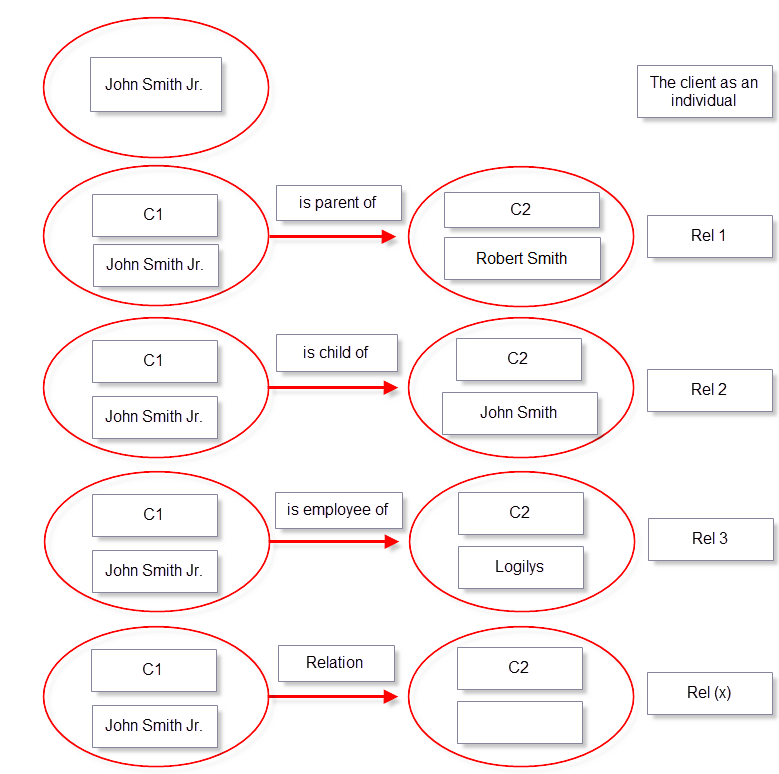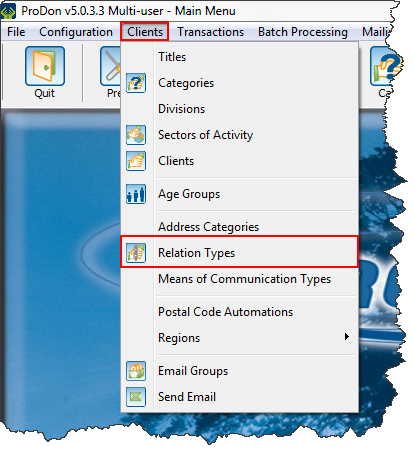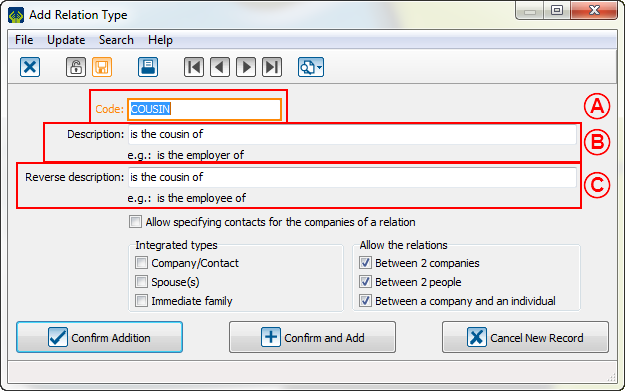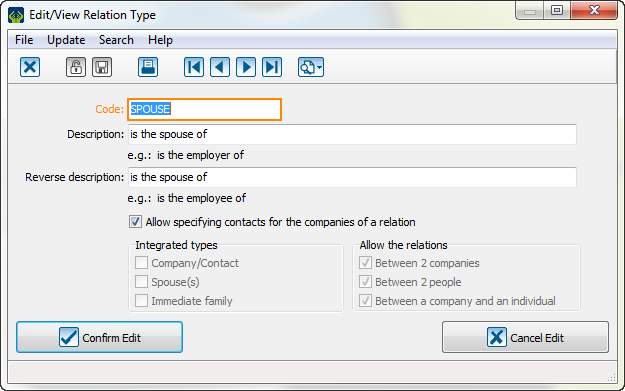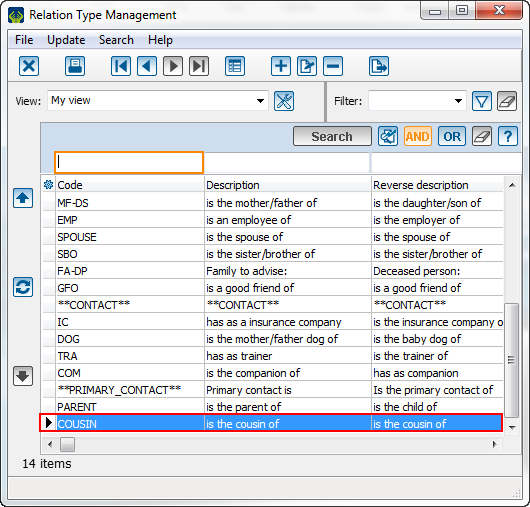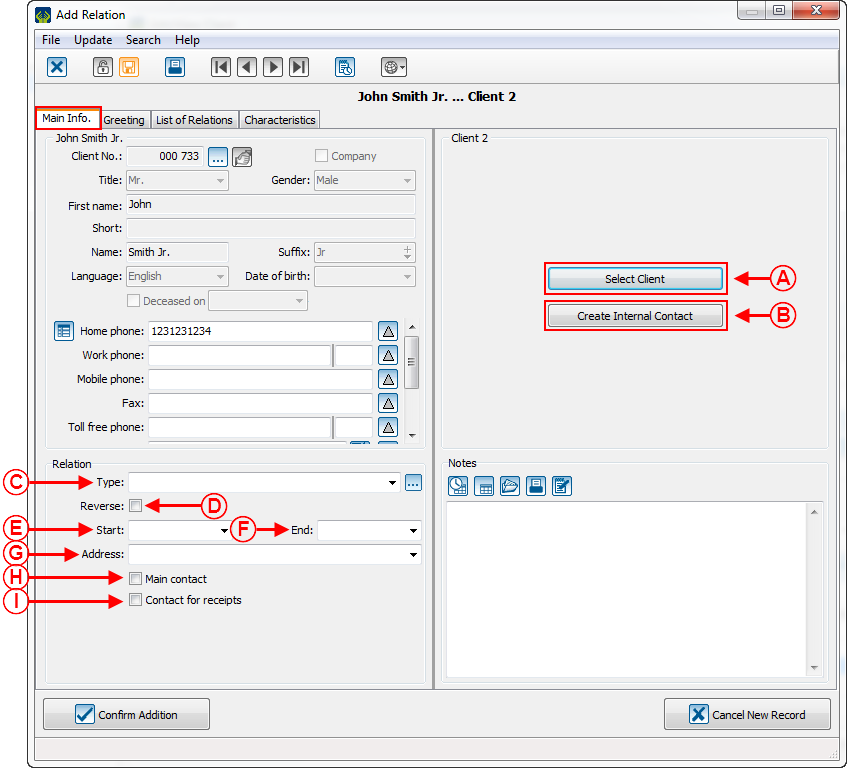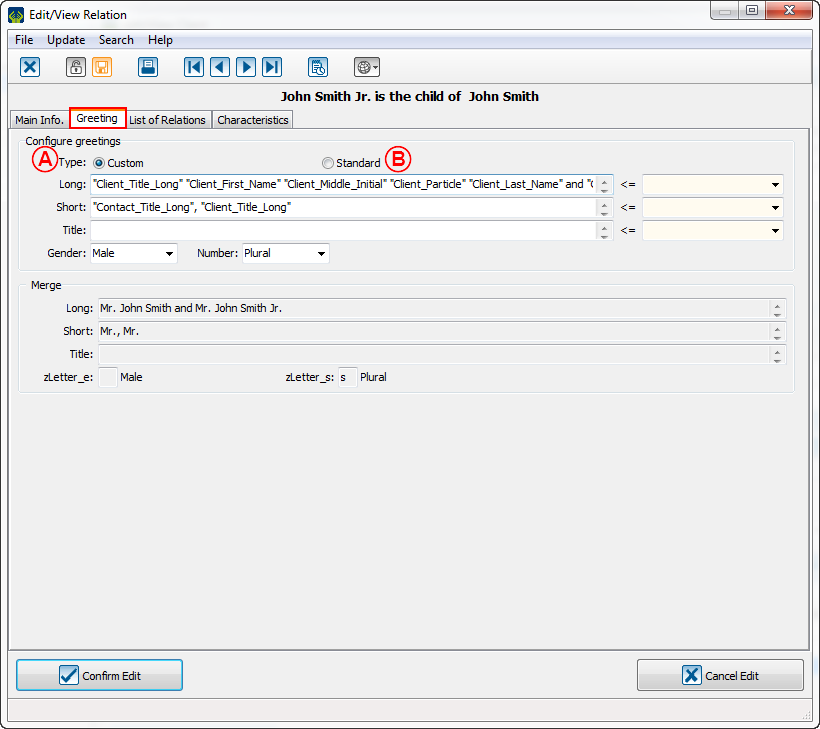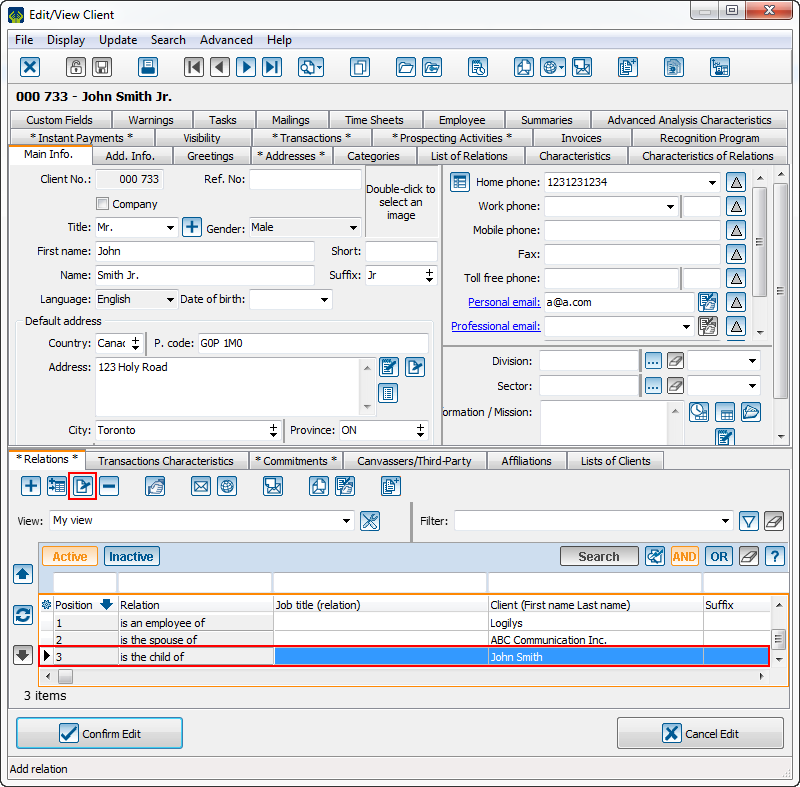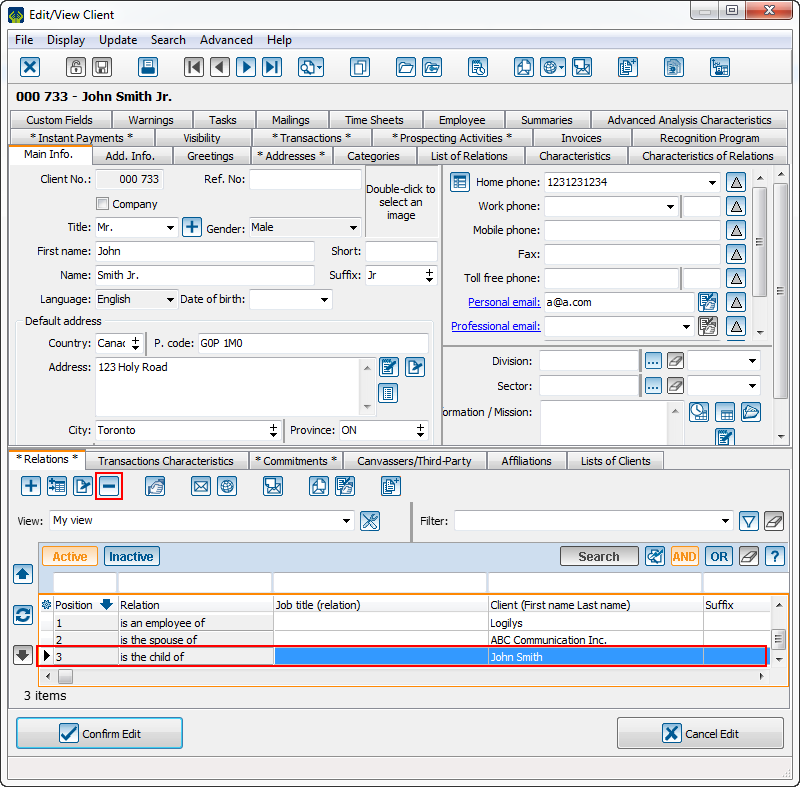Difference between revisions of "ProDon:Relations"
Jguillemette (talk | contribs) (→L'onglet « Salutation ») |
(Tag: Visual edit) |
||
| (33 intermediate revisions by one other user not shown) | |||
| Line 1: | Line 1: | ||
{{Header_TOC}}<br> | {{Header_TOC}}<br> | ||
| − | <span style="color: rgb(255, 0, 0);">''' | + | <span style="color: rgb(255, 0, 0);">'''Caution:''' </span>This document is for the '''version 5 and higher''' of '''''Prodon'''''. |
| − | |||
== Introduction == | == Introduction == | ||
| − | The relations are the contact network within ProDon. From this function, it is possible to link contacts to their organization, their family, their friends and their acquaintances. Furthermore, ProDon keeps a memory because it is important to be able to redraw the contact network of clients and organizations | + | The relations are the contact network within ProDon. From this function, it is possible to link contacts to their organization, their family, their friends and their acquaintances. Furthermore, ProDon keeps a memory because it is important to be able to redraw the contact network of clients and organizations. The relations are also important because they are linked to the mass mailing and E-mail blast. |
| − | |||
== The Relation concept == | == The Relation concept == | ||
A relation is the link between 2 entities. These entities can be individuals or companies. These links are depicted by Client 1 (C1) is linked to Client 2 (C2). | A relation is the link between 2 entities. These entities can be individuals or companies. These links are depicted by Client 1 (C1) is linked to Client 2 (C2). | ||
| − | |||
| − | |||
{| width="25%" cellspacing="1" cellpadding="1" border="1" class="wikitable" | {| width="25%" cellspacing="1" cellpadding="1" border="1" class="wikitable" | ||
| Line 34: | Line 30: | ||
|} | |} | ||
| − | From a | + | From a theoretical perspective, a relation should be shown as followed: |
| + | |||
| + | [[File:ProDon5_Relation_Relation_concept_001.png]] <br> | ||
| − | + | Here are the results with examples: | |
| − | [[ | + | 1) If C1 is an individual and C2 is also an individual:<br> |
| + | [[File:ProDon5_Relation_Relation_concept_002.png]] <br> | ||
| − | + | 2) If C1 is an individual and C2 is a company: <br> | |
| − | + | [[File:ProDon5_Relation_Relation_concept_005.png]] <br> | |
| − | + | 3) If C1 is a company and C2 is an individual: <br> | |
| − | + | [[File:ProDon5_Relation_Relation_concept_003.png]] <br> | |
| − | [[ | ||
| − | + | 4) If C1 is a company and C2 is also a company: <br> | |
| − | + | [[File:ProDon5_Relation_Relation_concept_004.png]] <br> | |
| − | [[ | ||
| − | + | Please note that even if a relation is '''''MUTUAL''''', it must always be read from C1 to C2: <br> | |
| − | |||
| − | |||
| − | |||
| − | |||
| − | |||
| − | + | [[File:ProDon5_Relation_Relation_concept_006.png]] <br> | |
| − | |||
| − | + | So, with a example from the relation tab of the client management of ProDon: <br> | |
| − | So, | ||
| − | |||
| − | [[ | + | [[File:ProDon5_Relation_Relation_concept_007.png]] <br> |
| − | One should understand this: | + | One should understand this: <br> |
| − | |||
| − | [[ | + | [[File:ProDon5_Relation_Relation_concept_008.png]] <br> |
== Add a relation type == | == Add a relation type == | ||
To add a relation type, go to the "Client" tab of the homepage and click on "Relation types". | To add a relation type, go to the "Client" tab of the homepage and click on "Relation types". | ||
| − | + | [[File:ProDon5_Relations_Add_a_relation_type_001.png]] | |
| − | |||
| − | [[ | ||
{| width="25%" cellspacing="1" cellpadding="1" border="1" class="wikitable" | {| width="25%" cellspacing="1" cellpadding="1" border="1" class="wikitable" | ||
| colspan="2" | This window will open: | | colspan="2" | This window will open: | ||
| − | + | ||
|- | |- | ||
| − | | colspan="2" | [[ | + | | colspan="2" | [[File:ProDon5_Relations_Add_a_relation_type_002.png]] |
|- | |- | ||
| width="50%" | | | width="50%" | | ||
| − | Click on the | + | Click on the [[File:Button_add_plus.png]] button to add a relation type, on the [[File:Edit_button.png]] button to edit and on the [[File:Button_Minus_remove_delete.png]] button to remove a relation type. |
| − | |||
|} | |} | ||
{| width="25%" cellspacing="1" cellpadding="1" border="1" class="wikitable" | {| width="25%" cellspacing="1" cellpadding="1" border="1" class="wikitable" | ||
| colspan="2" | Then, this window will open: | | colspan="2" | Then, this window will open: | ||
| − | |||
|- | |- | ||
| − | | colspan="2" | [[ | + | | colspan="2" | [[File:ProDon5_Relations_Add_a_relation_type_003.png]] |
|- | |- | ||
| width="50%" | | | width="50%" | | ||
<span style="color: rgb(255, 0, 0);">'''A:'''</span> The "Code" section is used to name a relation. | <span style="color: rgb(255, 0, 0);">'''A:'''</span> The "Code" section is used to name a relation. | ||
| − | |||
| − | |||
| <span style="color: rgb(255, 0, 0);">'''B:'''</span> The "Description" section is used to explain the link from client 1 to client 2. | | <span style="color: rgb(255, 0, 0);">'''B:'''</span> The "Description" section is used to explain the link from client 1 to client 2. | ||
| − | |||
|- | |- | ||
| colspan="2" | <span style="color: rgb(255, 0, 0);">'''C:'''</span> The "Reverse description" section is used to explain the link from client 2 to client 1. | | colspan="2" | <span style="color: rgb(255, 0, 0);">'''C:'''</span> The "Reverse description" section is used to explain the link from client 2 to client 1. | ||
| − | + | ||
|} | |} | ||
The "Integrated types" section shows preset configurations for a relation. | The "Integrated types" section shows preset configurations for a relation. | ||
| − | |||
{| width="25%" cellspacing="1" cellpadding="1" border="1" class="wikitable" | {| width="25%" cellspacing="1" cellpadding="1" border="1" class="wikitable" | ||
| − | | colspan="2" | [[ | + | | colspan="2" | [[File:ProDon5_Relations_Add_a_relation_type_004.png]] |
|- | |- | ||
| width="50%" | | | width="50%" | | ||
<span style="color: rgb(255, 0, 0);">'''A:'''</span> When the option "Company/Contact" is checked, automatically the options of the section "Allow the relations" are checked. The context where this option must be selected is when new relation type must be limited to a company and an individual. | <span style="color: rgb(255, 0, 0);">'''A:'''</span> When the option "Company/Contact" is checked, automatically the options of the section "Allow the relations" are checked. The context where this option must be selected is when new relation type must be limited to a company and an individual. | ||
| − | |||
| − | |||
| <span style="color: rgb(255, 0, 0);">'''B:'''</span> Please observe that by selecting this potion in the "Integrated types", the other options of the same section and also the section "Allow the relations" become locked. | | <span style="color: rgb(255, 0, 0);">'''B:'''</span> Please observe that by selecting this potion in the "Integrated types", the other options of the same section and also the section "Allow the relations" become locked. | ||
| − | |||
| − | |||
|} | |} | ||
{| width="25%" cellspacing="1" cellpadding="1" border="1" class="wikitable" | {| width="25%" cellspacing="1" cellpadding="1" border="1" class="wikitable" | ||
| − | | colspan="2" | [[ | + | | colspan="2" | [[File:ProDon5_Relations_Add_a_relation_type_005.png]] |
|- | |- | ||
| width="50%" | | | width="50%" | | ||
<span style="color: rgb(255, 0, 0);">'''A:'''</span> When the option "Spouse(s)" is checked, automatically the options of the section "Allow the relations" and the "Immediate family" box are checked. The context where this option must be selected is when new relation type must be limited to two persons that are in couple. | <span style="color: rgb(255, 0, 0);">'''A:'''</span> When the option "Spouse(s)" is checked, automatically the options of the section "Allow the relations" and the "Immediate family" box are checked. The context where this option must be selected is when new relation type must be limited to two persons that are in couple. | ||
| − | |||
| − | |||
| <span style="color: rgb(255, 0, 0);">'''B:'''</span> Please observe that by selecting this potion in the "Integrated types", the other options of the same section and also the section "Allow the relations" become locked. | | <span style="color: rgb(255, 0, 0);">'''B:'''</span> Please observe that by selecting this potion in the "Integrated types", the other options of the same section and also the section "Allow the relations" become locked. | ||
| − | |||
| − | |||
|} | |} | ||
{| width="25%" cellspacing="1" cellpadding="1" border="1" class="wikitable" | {| width="25%" cellspacing="1" cellpadding="1" border="1" class="wikitable" | ||
| − | | colspan="2" | [[ | + | | colspan="2" | [[File:ProDon5_Relations_Add_a_relation_type_006.png]] |
|- | |- | ||
| width="50%" | | | width="50%" | | ||
<span style="color: rgb(255, 0, 0);">'''A:'''</span> When the option "Immediate family" is checked, automatically the options of the section "Allow the relations" are checked. The context where this option must be selected is when new relation type must be limited to two persons that are from the same family. | <span style="color: rgb(255, 0, 0);">'''A:'''</span> When the option "Immediate family" is checked, automatically the options of the section "Allow the relations" are checked. The context where this option must be selected is when new relation type must be limited to two persons that are from the same family. | ||
| − | |||
| <span style="color: rgb(255, 0, 0);">'''B:'''</span> Please observe that by selecting this potion in the "Integrated types", the other options of the same section and also the section "Allow the relations" become locked. | | <span style="color: rgb(255, 0, 0);">'''B:'''</span> Please observe that by selecting this potion in the "Integrated types", the other options of the same section and also the section "Allow the relations" become locked. | ||
| − | |||
| − | |||
|} | |} | ||
The "Allow the relations" section allows the customization of the configuration of the relation types. | The "Allow the relations" section allows the customization of the configuration of the relation types. | ||
| − | |||
{| width="25%" cellspacing="1" cellpadding="1" border="1" class="wikitable" | {| width="25%" cellspacing="1" cellpadding="1" border="1" class="wikitable" | ||
| − | | colspan="2" | [[ | + | | colspan="2" | [[File:ProDon5_Relations_Add_a_relation_type_007.png]] |
|- | |- | ||
| width="50%" | | | width="50%" | | ||
<span style="color: rgb(255, 0, 0);">'''A:'''</span> When the option "Between 2 companies" is checked, the relation will be able to be set between 2 companies. | <span style="color: rgb(255, 0, 0);">'''A:'''</span> When the option "Between 2 companies" is checked, the relation will be able to be set between 2 companies. | ||
| − | |||
| <span style="color: rgb(255, 0, 0);">'''B:'''</span> When the option "Between 2 individuals" is checked, the relation will be able to be set between 2 individuals. | | <span style="color: rgb(255, 0, 0);">'''B:'''</span> When the option "Between 2 individuals" is checked, the relation will be able to be set between 2 individuals. | ||
| − | |||
|- | |- | ||
| colspan=2 |<span style="color: rgb(255, 0, 0);">'''C:'''</span> When the option "Between a company and an individual" is checked, the relation will be able to be set between a company and an individual. | | colspan=2 |<span style="color: rgb(255, 0, 0);">'''C:'''</span> When the option "Between a company and an individual" is checked, the relation will be able to be set between a company and an individual. | ||
| − | |||
|} | |} | ||
== Edit a relation type == | == Edit a relation type == | ||
| − | Ideally, a relation type should be edited before creating a relation that will be using it because the used sections will be locked. It is mostly identical to the addition of a relation type: it is possible to edit the "Code", the "Description", the "Reverse description", the "Integrated types" options and the "Allow the relations" section. To do so, select the relation to edit and click on the | + | Ideally, a relation type should be edited before creating a relation that will be using it because the used sections will be locked. It is mostly identical to the addition of a relation type: it is possible to edit the "Code", the "Description", the "Reverse description", the "Integrated types" options and the "Allow the relations" section. To do so, select the relation to edit and click on the [[File:Edit_button.png]] button. |
| − | |||
| − | |||
| − | |||
| − | |||
| − | |||
'''''CAUTION!''''' | '''''CAUTION!''''' | ||
| − | |||
In the following example, the relation has been configured in function that everything could be spouse of everything. | In the following example, the relation has been configured in function that everything could be spouse of everything. | ||
| − | + | [[File:ProDon5_Relations_Edit_a_relation_type_001.png]] | |
| − | |||
| − | [[ | ||
| − | So, it | + | So, it creates cases like these: |
| − | |||
{| width="40%" cellspacing="1" cellpadding="1" border="1" class="wikitable" | {| width="40%" cellspacing="1" cellpadding="1" border="1" class="wikitable" | ||
| Line 212: | Line 168: | ||
|} | |} | ||
| − | So, because there is already existing cases that imply all possibilities in this ProDon database, it is not possible to edit this relation example before adjusting all relations using this relation type first. Please be cautious to not create a | + | So, because there is already existing cases that imply all possibilities in this ProDon database, it is not possible to edit this relation example before adjusting all relations using this relation type first. Please be cautious to not create a catch-all relation. |
| − | |||
| − | |||
== Remove a relation type == | == Remove a relation type == | ||
It is possible to remove the relation types that are not used anymore. If the type is still used, the software will block the removal. | It is possible to remove the relation types that are not used anymore. If the type is still used, the software will block the removal. | ||
| − | + | Please select the relation type that must be removed and select the [[File:Button_Minus_remove_delete.png]] button in the Relation type management. | |
| + | |||
| − | + | [[File:ProDon5_Relations_Delete_a_relation_type_001.png]] | |
| − | |||
| − | |||
| − | |||
Then, click on "Confirm deletion" to finish the operation. | Then, click on "Confirm deletion" to finish the operation. | ||
| − | + | <br> | |
| − | [[ | + | [[File:ProDon5_Relations_Delete_a_relation_type_002.png]] |
== Add a relation == | == Add a relation == | ||
| Line 236: | Line 188: | ||
=== The "Main info" tab === | === The "Main info" tab === | ||
{| width="25%" cellspacing="1" cellpadding="1" border="1" class="wikitable" | {| width="25%" cellspacing="1" cellpadding="1" border="1" class="wikitable" | ||
| − | | colspan="2" |Press on the | + | | colspan="2" |Press on the [[File:Button_add_plus.png]] button to add a relation. |
| − | + | ||
|- | |- | ||
| − | | colspan="2" | [[ | + | | colspan="2" | [[File:ProDon5_Relations_Add_a_relation_001.png]] |
|} | |} | ||
| Line 245: | Line 197: | ||
{| width="25%" cellspacing="1" cellpadding="1" border="1" class="wikitable" | {| width="25%" cellspacing="1" cellpadding="1" border="1" class="wikitable" | ||
| colspan="2" | Then, this page opens: | | colspan="2" | Then, this page opens: | ||
| − | + | ||
|- | |- | ||
| − | | colspan="2" | [[ | + | | colspan="2" | [[File:ProDon5_Relations_Add_a_relation_002.png]] |
|- | |- | ||
| width="50%" | | | width="50%" | | ||
<span style="color: rgb(255, 0, 0);">'''A:'''</span> This option allows the selection among all clients and all companies of the database. | <span style="color: rgb(255, 0, 0);">'''A:'''</span> This option allows the selection among all clients and all companies of the database. | ||
| − | |||
| − | | <span style="color: rgb(255, 0, 0);">'''B:'''</span> This option allows the creation of a contact who will be visible only as | + | | <span style="color: rgb(255, 0, 0);">'''B:'''</span> This option allows the creation of a contact who will be visible only as C2 in ProDon. Even if a client number will be reserved for this C2, the result will not be an official client file, it will be a file accessible only from this relation. |
| − | |||
|- | |- | ||
| <span style="color: rgb(255, 0, 0);">'''C:'''</span> This option allows the determination of the relation type between these two parties. | | <span style="color: rgb(255, 0, 0);">'''C:'''</span> This option allows the determination of the relation type between these two parties. | ||
| − | |||
| − | |||
| − | + | | <span style="color: rgb(255, 0, 0);">'''D:'''</span> The "Reverse" checkbox allows the inversion of the selected relation in the type. For example, if the relation is "is the parent of", when the "Reverse" checkbox is checked, the relation should become "is the child of". | |
| + | |||
|- | |- | ||
| <span style="color: rgb(255, 0, 0);">'''E:'''</span> This section is used to indicate when the relation between these 2 parties has started. | | <span style="color: rgb(255, 0, 0);">'''E:'''</span> This section is used to indicate when the relation between these 2 parties has started. | ||
| − | |||
| − | |||
| − | + | | <span style="color: rgb(255, 0, 0);">'''F:'''</span> This section is used to indicate when the relation between these 2 parties has ended. Usually, this section is documented later. | |
| + | |||
|- | |- | ||
| <span style="color: rgb(255, 0, 0);">'''G:'''</span> The address option allows C1 (Client 1) address to be placed as the origin of the address of C2 (Client 2). | | <span style="color: rgb(255, 0, 0);">'''G:'''</span> The address option allows C1 (Client 1) address to be placed as the origin of the address of C2 (Client 2). | ||
| Line 275: | Line 223: | ||
| <span style="color: rgb(255, 0, 0);">'''H:'''</span> This checkbox allows C2 to become the main contact of C1. A company cannot become the main contact of an individual. This information will be stored in the relation. | | <span style="color: rgb(255, 0, 0);">'''H:'''</span> This checkbox allows C2 to become the main contact of C1. A company cannot become the main contact of an individual. This information will be stored in the relation. | ||
| − | |||
|- | |- | ||
| colspan="2" | <span style="color: rgb(255, 0, 0);">'''I:'''</span> If this box is checked, C2 will become the contact for receipts of C1. This information will be stored in the relation. | | colspan="2" | <span style="color: rgb(255, 0, 0);">'''I:'''</span> If this box is checked, C2 will become the contact for receipts of C1. This information will be stored in the relation. | ||
| − | |||
|} | |} | ||
| Line 284: | Line 230: | ||
{| width="25%" cellspacing="1" cellpadding="1" border="1" class="wikitable" | {| width="25%" cellspacing="1" cellpadding="1" border="1" class="wikitable" | ||
| colspan="2" | If the option '''A''' is selected, this window will open: | | colspan="2" | If the option '''A''' is selected, this window will open: | ||
| − | |||
|- | |- | ||
| − | | colspan="2" | [[ | + | | colspan="2" | [[File:ProDon5_Relations_Add_a_relation_003.png]] |
|- | |- | ||
| − | | In this window, there will be all clients of the database. The user will have to select the client 2 with whom the client 1 is in relation . | + | | In this window, there will be all clients of the database. The user will have to select the client 2 with whom the client 1 is in relation. |
| − | |||
|} | |} | ||
{| width="25%" cellspacing="1" cellpadding="1" border="1" class="wikitable" | {| width="25%" cellspacing="1" cellpadding="1" border="1" class="wikitable" | ||
| − | | colspan="2" | [[ | + | | colspan="2" | [[File:ProDon5_Relations_Add_a_relation_004.png]] |
|- | |- | ||
| colspan="2" | Then, the user will have to complete the relation section. | | colspan="2" | Then, the user will have to complete the relation section. | ||
| − | |||
|} | |} | ||
| Line 303: | Line 246: | ||
| colspan="2" | If the option '''B''' is selected, this window will open: | | colspan="2" | If the option '''B''' is selected, this window will open: | ||
| − | |||
|- | |- | ||
| − | | colspan="2" | [[ | + | | colspan="2" | [[File:ProDon5_Relations_Add_a_relation_005.png]] |
|- | |- | ||
| The user will have to enter the information as if it was a new client and then complete the relation section. '''Note:''' A client number will be preset. | | The user will have to enter the information as if it was a new client and then complete the relation section. '''Note:''' A client number will be preset. | ||
| − | |||
|} | |} | ||
=== The "Greeting" tab === | === The "Greeting" tab === | ||
It is possible to customize the greetings or it is possible to use the standard greetings. | It is possible to customize the greetings or it is possible to use the standard greetings. | ||
| − | |||
| − | |||
{| width="25%" cellspacing="1" cellpadding="1" border="1" class="wikitable" | {| width="25%" cellspacing="1" cellpadding="1" border="1" class="wikitable" | ||
|- | |- | ||
| − | | colspan="2" | [[ | + | | colspan="2" | [[File:ProDon5_Relations_Add_a_relation_006.png]] |
|- | |- | ||
| width="50%" |When the option '''A''' is selected, it is possible to customize which merge fields will be used when a user will have to send documents for the 2 contacts of the relation. | | width="50%" |When the option '''A''' is selected, it is possible to customize which merge fields will be used when a user will have to send documents for the 2 contacts of the relation. | ||
| − | + | | When the option '''B''' is selected, all choices are preset. | |
| − | | When the option '''B''' is selected, all choices are preset. | + | |
|} | |} | ||
| − | == | + | == Edit a relation == |
| − | + | To edit a relation, go to the relation tab of the client file, click on the relation that need to be edited and click on the [[File:Edit_button.png]] button or double-click on the relation. | |
| − | [[ | + | |
| + | [[File:ProDon5_Relations_Edit_a_relation_001.png]] | ||
{| width="25%" cellspacing="1" cellpadding="1" border="1" class="wikitable" | {| width="25%" cellspacing="1" cellpadding="1" border="1" class="wikitable" | ||
| − | | colspan="2" | | + | | colspan="2" | Then, the user will edit what needs edition and click on "Confirm Edit" to edit the link between these clients. |
| + | |||
|- | |- | ||
| − | |[[ | + | |[[File:ProDon5_Relations_Edit_a_relation_002.png]] |
|} | |} | ||
| − | == | + | '''NOTE:''' To archive a relation, set its end date. So, the organization will be able to keep traces in its database inactive relations. To see them, go to the relation tab of the client management and click on the [[File:Button_R-Inactive.png]] button. |
| − | + | ||
| + | == Delete a relation == | ||
| + | To delete a relation, go to the relation tab of the client file, click on the relation to delete and click on the [[File:Button_Minus_remove_delete.png]] button. | ||
| − | [[ | + | [[File:ProDon5_Relations_Delete_a_relation_001.png]] |
{| width="25%" cellspacing="1" cellpadding="1" border="1" class="wikitable" | {| width="25%" cellspacing="1" cellpadding="1" border="1" class="wikitable" | ||
| − | | colspan="2" | | + | | colspan="2" | Then, click on the "Confirm Deletion" to delete the link between these clients. |
|- | |- | ||
| − | |[[ | + | |[[File:ProDon5_Relations_Delete_a_relation_002.png]] |
|} | |} | ||
Latest revision as of 11:37, 17 May 2019
| Relations |
Caution: This document is for the version 5 and higher of Prodon.
Introduction
The relations are the contact network within ProDon. From this function, it is possible to link contacts to their organization, their family, their friends and their acquaintances. Furthermore, ProDon keeps a memory because it is important to be able to redraw the contact network of clients and organizations. The relations are also important because they are linked to the mass mailing and E-mail blast.
The Relation concept
A relation is the link between 2 entities. These entities can be individuals or companies. These links are depicted by Client 1 (C1) is linked to Client 2 (C2).
| Possible type of relations | |
|
C1 |
C2 |
| Individual | Individual |
| Individual | Company |
| Company | Individual |
| Company | Company |
From a theoretical perspective, a relation should be shown as followed:
Here are the results with examples:
1) If C1 is an individual and C2 is also an individual:

2) If C1 is an individual and C2 is a company:

3) If C1 is a company and C2 is an individual:

4) If C1 is a company and C2 is also a company:

Please note that even if a relation is MUTUAL, it must always be read from C1 to C2:
So, with a example from the relation tab of the client management of ProDon:
One should understand this:
Add a relation type
To add a relation type, go to the "Client" tab of the homepage and click on "Relation types".
| This window will open: | |
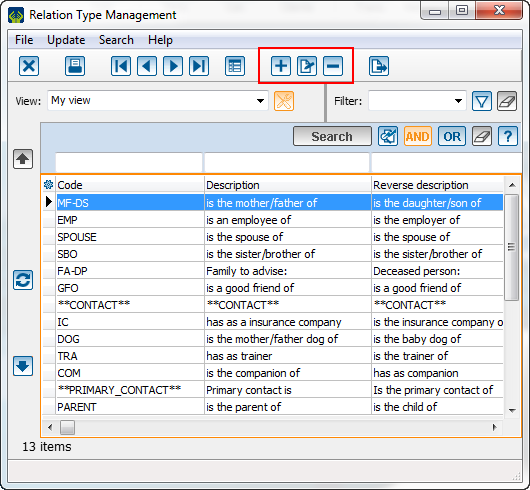
| |
|
Click on the | |
The "Integrated types" section shows preset configurations for a relation.
The "Allow the relations" section allows the customization of the configuration of the relation types.
Edit a relation type
Ideally, a relation type should be edited before creating a relation that will be using it because the used sections will be locked. It is mostly identical to the addition of a relation type: it is possible to edit the "Code", the "Description", the "Reverse description", the "Integrated types" options and the "Allow the relations" section. To do so, select the relation to edit and click on the ![]() button.
button.
CAUTION!
In the following example, the relation has been configured in function that everything could be spouse of everything.
So, it creates cases like these:
| Possible relations from this template | ||
| C1 | Relation | C2 |
| Individual | is spouse of | Individual |
| Individual | is spouse of | Company |
| Company | is spouse of | Individual |
| Company | is spouse of | Company |
So, because there is already existing cases that imply all possibilities in this ProDon database, it is not possible to edit this relation example before adjusting all relations using this relation type first. Please be cautious to not create a catch-all relation.
Remove a relation type
It is possible to remove the relation types that are not used anymore. If the type is still used, the software will block the removal.
Please select the relation type that must be removed and select the ![]() button in the Relation type management.
button in the Relation type management.
Then, click on "Confirm deletion" to finish the operation.
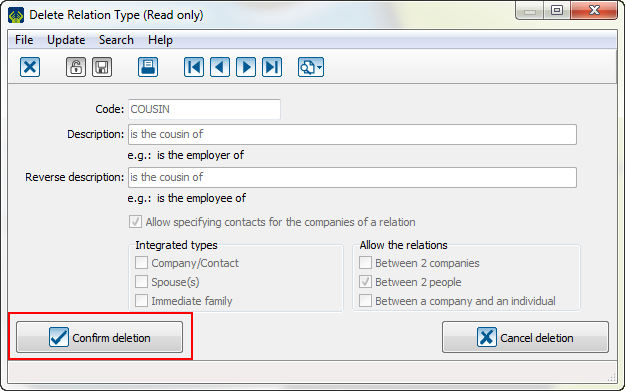
Add a relation
To add a relation, go to the relation tab of a client's file. Pour ajouter une relation, il faut aller dans l'onglet relation de la fiche d'un client.
The "Main info" tab
| Press on the | |
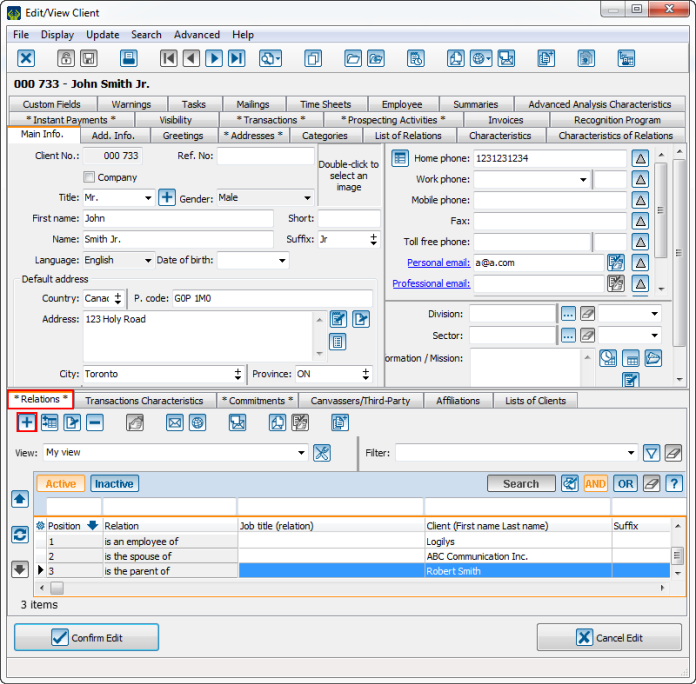
|
| If the option A is selected, this window will open: | |
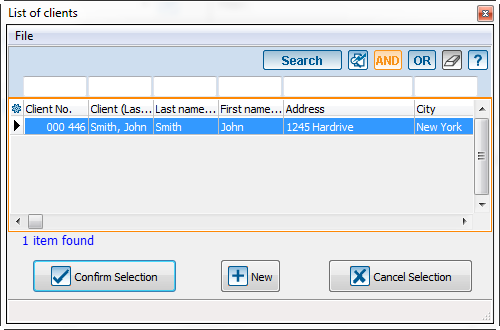
| |
| In this window, there will be all clients of the database. The user will have to select the client 2 with whom the client 1 is in relation. | |
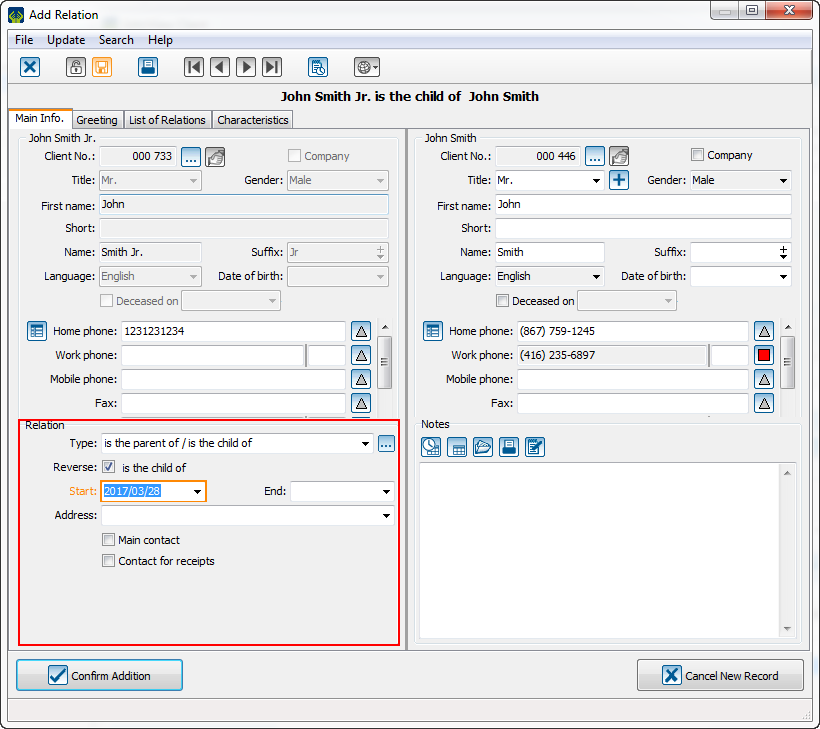
| |
| Then, the user will have to complete the relation section. |
| If the option B is selected, this window will open: | |
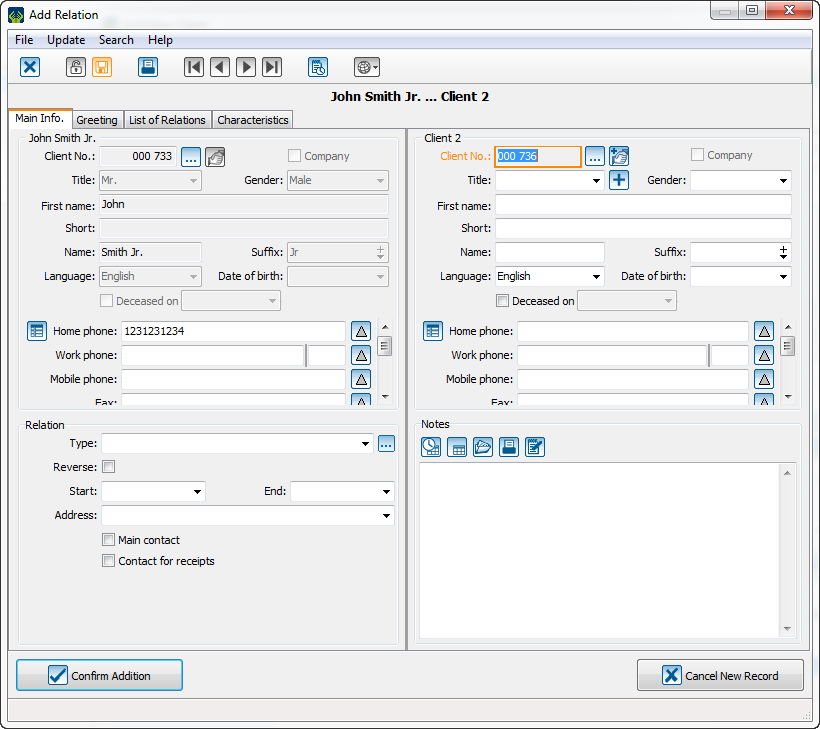
| |
| The user will have to enter the information as if it was a new client and then complete the relation section. Note: A client number will be preset. | |
The "Greeting" tab
It is possible to customize the greetings or it is possible to use the standard greetings.
Edit a relation
To edit a relation, go to the relation tab of the client file, click on the relation that need to be edited and click on the ![]() button or double-click on the relation.
button or double-click on the relation.
| Then, the user will edit what needs edition and click on "Confirm Edit" to edit the link between these clients. | |
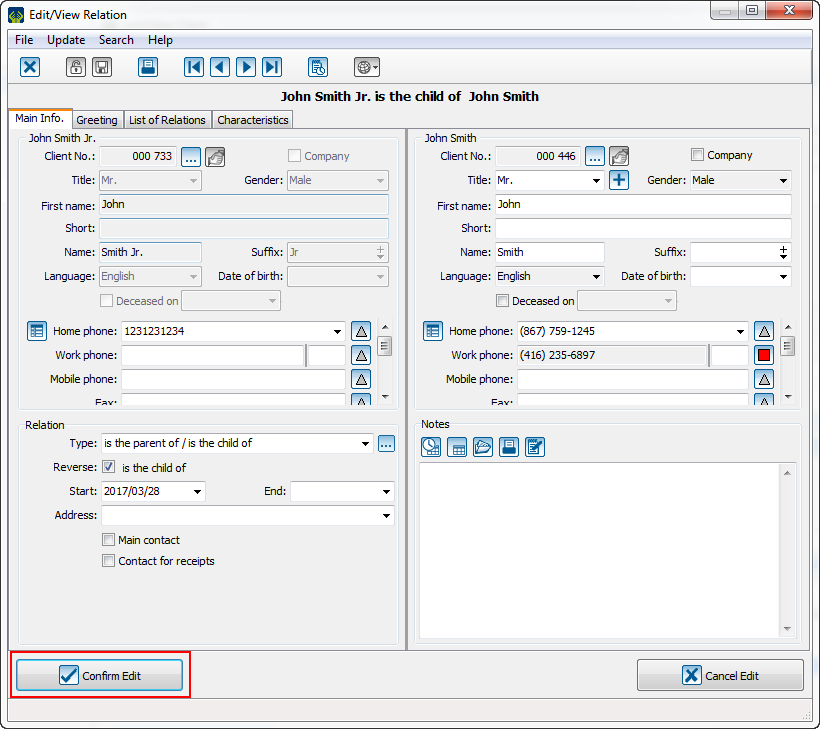
| |
NOTE: To archive a relation, set its end date. So, the organization will be able to keep traces in its database inactive relations. To see them, go to the relation tab of the client management and click on the ![]() button.
button.
Delete a relation
To delete a relation, go to the relation tab of the client file, click on the relation to delete and click on the ![]() button.
button.
| Then, click on the "Confirm Deletion" to delete the link between these clients. | |
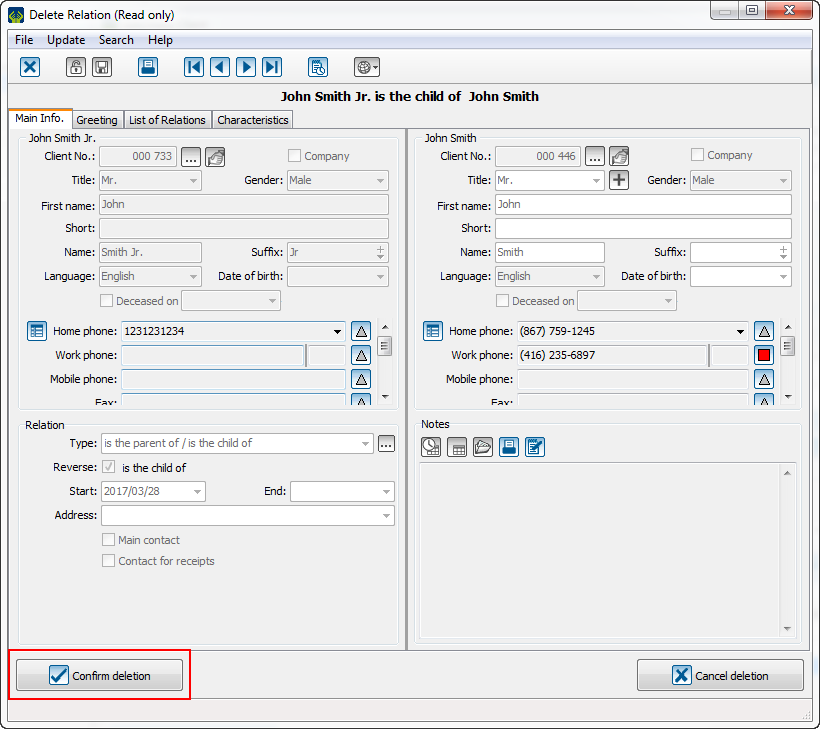
| |
Document name: ProDon:Relations
Version : 5.0.3.3

